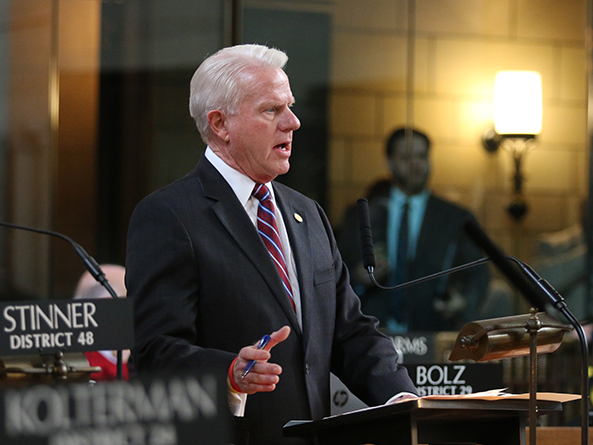Banking, Commerce and Insurance
Emergency medical billing and updates to a variety of banking laws were among the issues considered by the Legislature this session.
Insurance
Lawmakers passed a bill intended to eliminate “surprise” medical bills.
LB997, introduced by Sen. Adam Morfeld of Lincoln, creates the Out-of-Network Emergency Medical Care Act. The bill, passed on a 47-0 vote, allows for resolution of unexpected medical bills due to an emergency visit to a health care facility or provider that was not in a patient’s health insurance network.
The bill defines an emergency as the sudden onset of a medical condition that would place the person in serious jeopardy if not treated immediately, and limits a patient’s expenses to what would have been charged if the patient had been treated at an in-network facility.
Senators also approved a bill to prevent insurers from excluding coverage for asynchronous dermatology services.
Seward Sen. Mark Kolterman’s LB760 defines asynchronous review as the acquisition and storage of medical information at one location that is then forwarded to or retrieved by a health care provider at a different location for evaluation.
Under the bill, beginning Jan. 1, 2021, asynchronous review that is deemed medically necessary cannot be excluded from a health insurance policy solely because it is delivered by a dermatologist asynchronously. Reimbursement rates will be negotiated between the provider and the insurer.
LB760 passed on a 45-0 vote.
Two insurance mandates failed to advance from committee.
LB949, introduced by Sen. Kate Bolz of Lincoln, would have required that any individual or group health insurance policy or self-funded employee benefit plan that provides reimbursement for prescription insulin limit the amount that a covered individual would pay for the drug. Under the bill, the cost of insulin could not exceed $100 for a 30-day supply.
LB804, introduced by Omaha Sen. Justin Wayne, would have mandated that health insurance companies in Nebraska cover the cost of epinephrine autoinjectors—emergency allergy medication—for people younger than 19, beginning Jan. 1, 2021.
Banking
A bill that makes updates to several areas of Nebraska banking law passed this session.
Among other provisions, LB909, introduced by Sen. Matt Williams of Gothenburg:
• allows minors to establish deposit accounts;
• allows the director of the state Department of Banking and Finance to examine licensees at his or her discretion;
• allows a Nebraska trust company acting as a trustee or agent to invest fiduciary funds in private instruments funds managed by an affiliate of the trust company;
• grants state-chartered banks, savings associations and credit unions the same rights, powers, privileges and immunities as federally chartered entities doing business in the state as of Jan. 1, 2020; and
• allows certain employees of the state Department of Banking and Finance to borrow from a financial institution chartered by the department. The department director, deputy director, counsel, attorney or financial institution examiner still are prohibited from such borrowing.
LB909 also includes five other bills introduced by Williams:
• LB852, which, for purposes of filing effective financing statements, expands the definition of farm product to include goats and hemp and allows someone improperly identified as a debtor on a financial statement to obtain relief;
• LB853, which allows financial institutions to notify a caretaker or other third-party reasonably associated with a vulnerable adult or senior suspected to be the victim of financial exploitation and allows a financial institution to put up to a 30-day hold on any suspicious transaction;
• LB854, which allows financial institutions not to retain any deposit of public funds that is required to be secured unless it has secured the deposits for the benefit of the governmental units that have funds with such a financial institution;
• LB908, which requires licensure and registration for licensees under the Delayed Deposit Services Licensing Act through the Nationwide Mortgage Licensing System and Registry, starting Jan. 1, 2021; and
• LB939, which allows the Collection Agency Licensing Board to require licensure and registration through the NMLSR, starting Oct. 1, 2020.
LB909 passed 48-0 and took effect immediately.
LB808, introduced by Sen. Andrew La Grone of Gretna, enacts new sections in the Nebraska Model Business Corporation Act related to defective corporate actions.
The measure contains provisions of six additional bills:
• LB775, introduced by Williams, which makes several technical changes to the Nebraska Real Property Appraiser Act;
• LB782, introduced by Gering Sen. John Stinner, which allows students within 120 days of completing an accounting degree to take test sections of the certified public accountant exam;
• LB767, introduced by Omaha Sen. Brett Lindstrom, which changes laws governing condominium associations, including reducing the time allowed to recover damages from an alleged deficiency in the design or construction of a condominium;
• LB902, introduced by Sen. Patty Pansing Brooks of Lincoln, which modernizes and reforms the terms of an irrevocable trust;
• LB929, introduced by Lindstrom, which exempts from the Nebraska Real Estate License Act an unlicensed person who provides a list of potential purchases to a broker or real estate salesperson; and
• LB1123, also introduced by Lindstrom, which expands the definition of security to include student loans under the Public Funds Deposit Security Act.
LB808 passed on a 47-0 vote.


